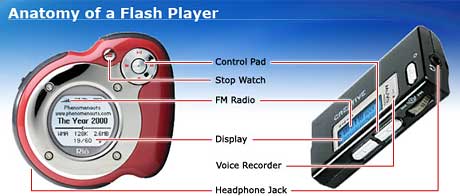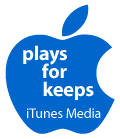With no apologies whatsoever to Microsoft's Six
Tips for Buying an MP3 Player with Flash Memory, the Lite Side
presents
Seven Tips for Buying an MP3 Player
If you're the type of person who's on the go all the time and wants
to jam to your favorite tunes while commuting to work, trekking across
campus, or working out, then having the right digital music player is
essential. Here are six seven tips to help you find
the digital music player that's right for you:
1. Understand the basics.
For the klutz, a player that uses flash memory to store music has
distinct advantages over a player that uses a hard drive. Simply put,
flash memory players have no moving parts, meaning that you can drop
them and not worry about damaging a hard drive - even if you do damage
the rest of the player.
For the forgetful, a player that uses flash memory has another
advantage - it's more likely to survive a trip through the laundry than
a player with a delicate hard drive. No promises here, but survival
chances are better.
Those stupid hard drive iPods digital music players
are just sooooo delicate that they'd never survive a drop. If you're an
active person, a klutz, or absent-minded, think flash memory. Hard
drives are for wimps - or at least people who are going to take very
good care of their hardware.
2. Make sure you're getting all the goodies.
Many digital music players can do more than just play music. Some
can sync with your personal calendar and your address book. Some can be
used as portable file storage. Some can even store and display your
digital photographs.

Why would you want a music player without all this?
Some have a built-in FM tuner, clock, or stopwatch - features that
can be found in tiny radios and cheesy wristwatches at any dollar
store. Some come with extra accessories like decent headphones or a
lanyard.
Some let you add specialized things like voice recording, a FireWire
cable, or an FM transmitter so you can listen to your
iTunes music on your car radio. Of course, these
features come at an additional cost so only those who need these
feature have to pay for them.
3. You'll want a display.
When you have hundreds of songs on your player, you really need an
easy way to select your music by artist, album, or genre. This is
critical if you want to find that one song or artist you really want to
hear. You know, like the iPod has, with that wonderful navigation
system. (Remember, players under 512 MB just don't hold that much
music....)
A display also comes in handy when you're looking for your favorite
radio station, which is why most of those crappy dollar store FM radios
with headphones are pretty horrid to use. Then again, if you want to
listen to the radio, why not buy a cheap radio instead a more expensive
digital music player?
If you just want to listen to part of your music collection
randomly, there's no point in having a display. If you're busy jogging,
working at your computer, or driving around town, you need your eyes
and hands free.
4. Let a professional make your next playlist.
Having an FM radio lets you put your player on autopilot as you
mountain bike, cycle, or roller blade.
That's what you really want, isn't it? Letting the DJ at your
favorite radio station pick the music is the reason you bought a
digital music player in the first place and then filled it with your
favorite music.
Trust the professionals. You could never create as good a playlist -
and just think of all the ads you'd miss out on!
5. Pick the right size for you.
The price of a player will depend on its storage capacity - the more
megabytes (MB) of storage it has, the more music it can hold, and the
more it will cost. If you're ripping your own CDs, using a player with
Windows Media Audio (WMA) support as well as MP3 support gives you the
most music per megabyte by using lo-fi 64 Kbps sampling.
Here are some quick rules of thumb for how much music per megabyte
you get, depending on the quality of the compression. For FM radio
quality 64 Kbps sampling:
|
Capacity
|
Number of songs
|
Hours of play*
|
|
128 MB
|
60
|
4
|
|
256 MB
|
100
|
8
|
|
512 MB
|
250
|
16
|
|
1 gigabyte
|
500
|
32
|
- * How long you can listen before your digital music player plays
every song you've installed on it.
If you want better sounding music, you might want to consider 128
Kbps sampling, such as Apple uses in iTunes (if you don't care about
quality, why are you buying a digital music player?):
|
Capacity
|
Number of songs
|
Hours of play*
|
|
128 MB
|
30
|
2
|
|
256 MB
|
60
|
4
|
|
512 MB
|
125
|
8
|
|
1 gigabyte
|
250
|
16
|
|
4 gigabytes
|
1000
|
64
|
|
6 gigabytes
|
1500
|
96
|
|
20 gigabytes
|
5000
|
320
|
Now do you understand why Apple doesn't make low-capacity iPod
shuffles. Who'd pay $50-80 so they could carry only four CD's worth of
music on a digital music player?
The question is, How much music do you want on hand? If you want
your whole music library, you probably won't be happy with any flash
music player. But if you just want something so you can take part of
your collection on a run or bike ride, that's where the flash players
excel.
6. Don't worry about multiple one online stores.
Have you ever been on the hunt for a particular song? Some obscure
indie rock tune or rare jazz performance you heard on the radio? If you
don't use an iPod, you might have to shop at more than one store before
you find the song you're looking for. Having the flexibility to choose
from over 1 million tracks of music from multiple online music stores
such as MSN Music, Napster, MusicMatch, and
Walmart can consume a lot of your time and try your patience.
With the iPod, you only have to check one source -
the iTunes Music Store . If they don't have it, you're SOL, and you
know it without wasting time trying to find an online music store that
just might have that obscure CD available. (What are the odds that one
service will have a noticeably different selection from the rest?)
. If they don't have it, you're SOL, and you
know it without wasting time trying to find an online music store that
just might have that obscure CD available. (What are the odds that one
service will have a noticeably different selection from the rest?)
Want Natalie Cole's Unforgettable CD? Forget it! Something by Garth
Brooks? You're up a creek without a paddle. The Beatles? Sorry, but
they don't want you buying their music from an online music service.
Even the industry-leading iTunes Music Store doesn't offer everything
you might want, but if they don't have it, you'll discover that pretty
quickly. Then it's time to look for a low-priced (maybe previously
played) CD....
Some non-Apple online music stores offer subscription services so
you can download all the songs you want for about the cost of a CD each
month. Just don't forget to pay, or you won't be able to listen to all
of those digitally protected files you downloaded to that digital music
player.
7. Don't worry about multiple software choices.
Whether you use a Windows PC or a Macintosh computer, Apple's iTunes
is the right software for you - and it's free. With iTunes, you can rip
your CDs to high quality MP3 or AAC files, buy music online, organize
your music collection your way, easily burn your own mix CDs, and even
share your music library with up to five other networked iTunes users
each and every day.
iTunes even makes it easy to create a playlist just for the iPod
shuffle.
Does that make life too easy for you?
 PlaysForKeeps
PlaysForKeeps
If you buy a device that has the PlaysForKeeps logo, you'll know
that you can use it with Apple's free iTunes music software, iPod music
players, and iTunes music stores.
Or you can pick the Windows-only PlaysForSure products and be sure
it won't work with the world's leading online music service or most
popular music players.
Sometimes it pays to follow the crowd.


 PlaysForKeeps
PlaysForKeeps
